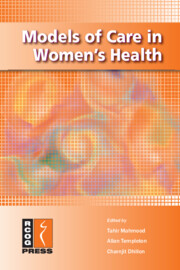Book contents
- Frontmatter
- Contents
- About the authors
- Abbreviations
- Preface
- CHAPTER 1 Setting the scene
- CHAPTER 2 Early pregnancy loss, including ectopic pregnancy and recurrent miscarriage
- CHAPTER 3 Infertility
- CHAPTER 4 Acute gynaecology
- CHAPTER 5 Sexual and reproductive health services
- CHAPTER 6 Termination of pregnancy
- CHAPTER 7 Heavy menstrual bleeding
- CHAPTER 8 Post-reproductive gynaecology
- CHAPTER 9 Urogynaecology
- CHAPTER 10 Vulval disease
- CHAPTER 11 Gynaecological oncology
- CHAPTER 12 Colposcopy services
- CHAPTER 13 Laparoscopic surgery
- CHAPTER 14 Gynaecological risk management
- CHAPTER 15 The role of the clinical director
- CHAPTER 16 Recommendations
- Index
CHAPTER 4 - Acute gynaecology
Published online by Cambridge University Press: 05 July 2014
- Frontmatter
- Contents
- About the authors
- Abbreviations
- Preface
- CHAPTER 1 Setting the scene
- CHAPTER 2 Early pregnancy loss, including ectopic pregnancy and recurrent miscarriage
- CHAPTER 3 Infertility
- CHAPTER 4 Acute gynaecology
- CHAPTER 5 Sexual and reproductive health services
- CHAPTER 6 Termination of pregnancy
- CHAPTER 7 Heavy menstrual bleeding
- CHAPTER 8 Post-reproductive gynaecology
- CHAPTER 9 Urogynaecology
- CHAPTER 10 Vulval disease
- CHAPTER 11 Gynaecological oncology
- CHAPTER 12 Colposcopy services
- CHAPTER 13 Laparoscopic surgery
- CHAPTER 14 Gynaecological risk management
- CHAPTER 15 The role of the clinical director
- CHAPTER 16 Recommendations
- Index
Summary
Key points
✓ Every centre that delivers elective gynaecology care should provide access to acute gynaecology services.
✓ Acute gynaecology services should be accessible round the clock and within 24 hours of referral.
✓ Units should consider combining acute gynaecology and early pregnancy into emergency gynaecology services.
✓ Every acute gynaecology unit should have a lead consultant responsible for that service.
✓ Units should adopt and publish a care pathway that reflects local circumstances.
✓ Evidence-based protocols and guidelines for common conditions should be available.
✓ Units should have a robust system for review and handover of outpatients and inpatients.
✓ Every unit should have access to training programmes for medical and nursing staff.
✓ There should be a rolling audit programme that feeds into clinical governance structures.
✓ Units should ensure a robust risk management and clinical governance system.
Introduction
Emergency gynaecology is rapidly developing in the UK but remains mostly fragmented into early pregnancy and acute gynaecology. Early pregnancy units provide care to women in the first 20 weeks of pregnancy while acute gynaecology units deliver care to women who are not pregnant. Conditions treated include pelvic inflammatory disease, acute pelvic pain, lower genital tract infections, excessive vaginal bleeding, acute pelvic mass complications, vulval abscesses, genital tract injuries (including those resulting from sexual assault), acute urinary retention and ovarian hyperstimulation syndrome (OHSS). Emergency contraception is also provided in such units.
There is a dearth of literature on patient and service surveys, treatment guidelines and protocols and standards for acute gynaecology. A nationwide audit was therefore commissioned for this work, to facilitate understanding of the state of acute gynaecology services in the UK. Much of the other material for this chapter was limited but useful in establishing a foundation for the development of acute gynaecology.
The service user's view
There is a dearth of evidence for acute gynaecology and a comprehensive search yielded no patient or service surveys. Seventy-six responses were received from a nationwide audit of acute gynaecology units. Results show that:
• 33 centres (44%) had early pregnancy units and provided acute gynaecology from wards (n = 14, 42%) or shared premises including accident and emergency (n = 10, 30%). Nine (27%) centres had no provision for acute gynaecology and, of these, six (67%) had no consultant lead.[…]
Keywords
- Type
- Chapter
- Information
- Models of Care in Women's Health , pp. 34 - 44Publisher: Cambridge University PressPrint publication year: 2009



